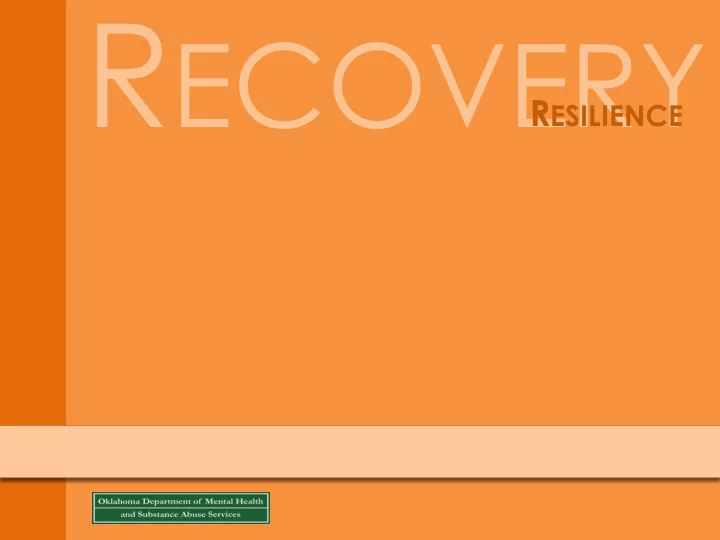

R ECOVERY R ESILIENCE
Thank you! • On behalf of the Oklahoma Department of Mental Health and Substance Abuse Services, thank you for participating in today’s ZORRO Summit! • Never doubt that a small group of thoughtful, committed, citizens can change the world. Indeed, it is the only thing that ever has. Margaret Mead 2
ODMHSAS - Responsibilities • Overall responsibilities encompassed on Title 43A • Key functions – related to mental health and substance abuse service delivery – Single State Authority for Mental Health and Substance Abuse Treatment – Advocate for effective and safe BH treatment – Regulator – certifying body for treatment programs standard – Purchaser of treatment services R ECOVERY – Provider of services R ESILIENCE 3
Title 450 • The ODMHSAS is statutorily mandated to regulate those residential care facilities and community mental health center treatment programs with which the Department contracts and regulate all substance abuse treatment. These rules and regulations are found in various chapters of Title 450 of the state's R ECOVERY Administrative Rules. RESILIENCE 4
New Responsibilities • Beginning July 1, 2012, the Legislature entrusted the ODMHSAS with the responsibility of managing the state’s match for Medicaid BH services. • The OHCA is an essential partner in this process. • All ethical and effective providers are needed and appreciated in this effort! 5
Mental Health in Oklahoma • Untreated mental illness can lead to tragic consequences… unless the trajectory is changed! – Untreated mental illness actually increases public costs — for prisons, nursing home care, emergency room and other community hospital services, and disability. R ECOVERY R ESILIENCE 6
National Perspective • NAMI Report Card D to a B • No A’s, 1 of only 6 States to have a B • Reported that Oklahoma excels in care, just not legislative funding to make it widely available • The President’s New Freedom Commission on Mental Health (2003) found that: – Recovery from mental illness is now a real possibility. – A life in the community for everyone can be realized. R ECOVERY R ESILIENCE 7
People Do Recover! Recovery rates for mental illnesses surpass the treatment success rates for many other physical illnesses, including heart disease. • Schizophrenia, 60% • Bipolar Disorder, 80% • Major Depression, 65% to 80% • Addiction Treatment, 70% RECOVERY (Report of the National Advisory Mental Health Council, March 1998) R ESILIENCE 8
New Beliefs People in recovery… • Do function well in society • Do make a positive contribution to society • Do learn ways to manage symptoms • Use experience with mental illness as a source of knowledge and expertise • Do learn from and teach other consumers • Do recover from serious mental illness R ECOVERY R ESILIENCE 9
G O A L • Our goal is to create the best public behavioral health system in the United States. The three top priorities are – Easy Access to Service; – Best Quality of Service; and – Best Treatment Outcomes. 10
Charge to Workgroups • Each of the workgroups formed today are asked to: – Limit work to next six months (or sooner) – Make recommendations in topic area that will: • Increase access • Maximize resources • Utilize best and promising practices • Improve quality • Improve outcomes 11
Invitation • You are invited to join one of the workgroups now. However, please feel no obligation. Your attendance today is appreciated and we understand if you cannot make a further commitment of your time and energy. • There are sign-up sheets for each workgroup in the rooms assigned. 12
Words from Formal Advisory Groups • Before we adjourn to our groups, I’d like to describe how these recommendations will be used, and how our formal advisory groups will be involved. • Although all recommendations will be considered, we ask that each group rank order them. The top three will be given priority for analysis. 13
Process • The joint leadership teams of ODMHSAS and OHCA meet monthly. The recommendations will be reviewed in these joint meetings and will be ranked for consideration at that time. • A page on each of our websites will be designated to post updates so that workgroup participants can see what has been decided on each recommendation and what actions have been taken. 14
Standing Advisory Groups • There are three standing advisory groups that will be called on to assist the ODMHSAS and OHCA as needed with further study of some recommendations: – State Planning and Advisory Council – State Advisory Team for Children’s Behavioral Health – Behavioral Health Advisory Council 15
Greeting from Standing Advisory Groups • State Planning and Advisory Council – Karen Orsi, Director, Oklahoma Mental Health and Aging Coalition • State Advisory Team for Children’s Behavioral Health – – Joni Bruce, Executive Director, Oklahoma Family Network • Behavioral Health Advisory Council – Laura Boyd, Executive Director, Oklahoma Therapeutic Foster Care Association 16
Contact Information Carrie Slatton-Hodges Oklahoma Department of Mental Health and Substance Abuse Services 1200 NE 13 th St. PO Box 53277 Oklahoma City, OK 73152 405.522.3877 chodges@odmhsas.org R ECOVERY R ESILIENCE 17
Recommend
More recommend